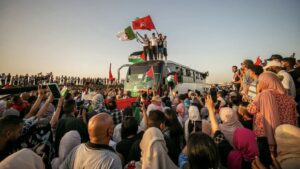Imam Dr. A. Rashied Omar
We once again welcome the most anticipated month on the Islamic calendar, the blessed month of Ramadan.
The fasting month of Ramadan is a month of great blessings and spiritual rejuvenation, but it is also a month of reflection and introspection.
At the global level Muslims will enter Ramadan 2019 faced with an unprecedented level of extremism causing untold suffering and targeting places of worship during sacred times.
In the first quarter of 2019 congregants at sacred places of worship around the world have been killed and maimed at an alarming level. Last Easter Sunday 22 April 2019, more than 350 people were killed and close to 500 maimed in eight coordinated attacks on Christian Churches and hotels in Sri Lanka. This came in the wake of an attack on two Masjids in Christchurch, New Zealand, where 51 musallis were killed while the Friday jumu`ah khutbah was being delivered. More distant from us, and perhaps the reason many may not have been aware, 21 worshippers were killed and 111 injured on 27 January 2019 when assailants, who claimed to adhere to the Muslim faith, detonated two bombs during Mass at the Cathedral of our Lady of Mount Carmel in Sulu Island in the Philippines.
The horrific events of 2019 is an intensification of scores of attacks on places of worship all over the world. On 27 October 2018, 11 Jewish worshippers were killed during Shabbat morning services at the Tree of Life Synagogue in Pittsburg, Pennsylvania.
This ongoing cycle of violence and hostile developments at the global level threaten to defile the devotion, compassion and serenity that are the hallmarks of the blessed month of Ramadan.
This Ramadan we need to continue to respond to extremist acts of wanton killing by constantly reminding ourselves that we are compelled by our faith to protect, defend and preserve the sanctity of all human life and all places of worship. The Glorious Qur’an is replete with references concerning the sacredness of human life (Q6:151; Q17:33; Q25:68). Moreover, Qur’an 22:40 commands Muslims to protect all places of worship. It is interesting to note that this verse provides precedence to the protection of monasteries (sawam`i) of Christian monks and churches (biya’) and synagogues (salawat) of the Jews over that of masajidin order to underline their inviolability as well as the duty of Muslims to safeguard them against any desecration or abuse, and protect freedom of belief in general.
‘Not in our name’
In light of this clear Qur’anic injunction, it is difficult to comprehend that so-called Muslim groups claim responsibility for exploding bombs during the middle of Christian Church services.
Our message this Ramadan should be asserting once again loudly and clearly that the heinous acts of murder and violence perpetrated by Muslim groups are dishonourable and betray any expression of faith in Islam. Their claim to act in the name of Islam is an aberration of our faith and we therefore unswervingly and emphatically proclaim “Not in Our Name.”
Notwithstanding the despondency, which abounds both within and outside our community, it is the responsibility and duty of conscientious believers to not surrender to fear and despair. We need to keep the lamp of hope alive in our communities and Ramadan provides an ideal opportunity to do so.
The exacting discipline of fasting in Ramadan fortifies and revitalizes our spiritual resources. However, in addition to the overall goal of spiritual transformation, fasting during Ramadan should inculcate in the spiritual seeker a deep sense of solidarity and compassion with the poor and the marginalized. We must therefore adorn our fasts with benevolence by becoming more generous with our wealth and time, and by actively and sincerely joining real efforts towards social justice for the poor and the marginalized.
Last, but not least, Ramadan is also a time for intensifying supplications. We should never underestimate the power of prayer. We believe that prayer and du`a draws human attention to things that need our care and consideration, and that Allah, the Most Compassionate, hears our prayers, which can work to change human events and history. Moreover, supplication is an integral part of the etiquette of fasting and Ramadan is an ideal time for us to seek corrective action and healing through intensified prayer. At this sacred time of Ramadan Muslims need to recommit themselves to the work of peace and justice.
We wish all Muslims a spiritually rejuvenating Ramadan and hope this special time will bring greater peace, justice and social integration to our troubled world.


